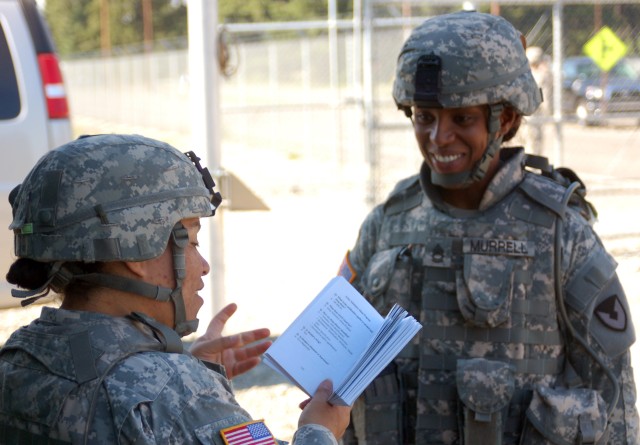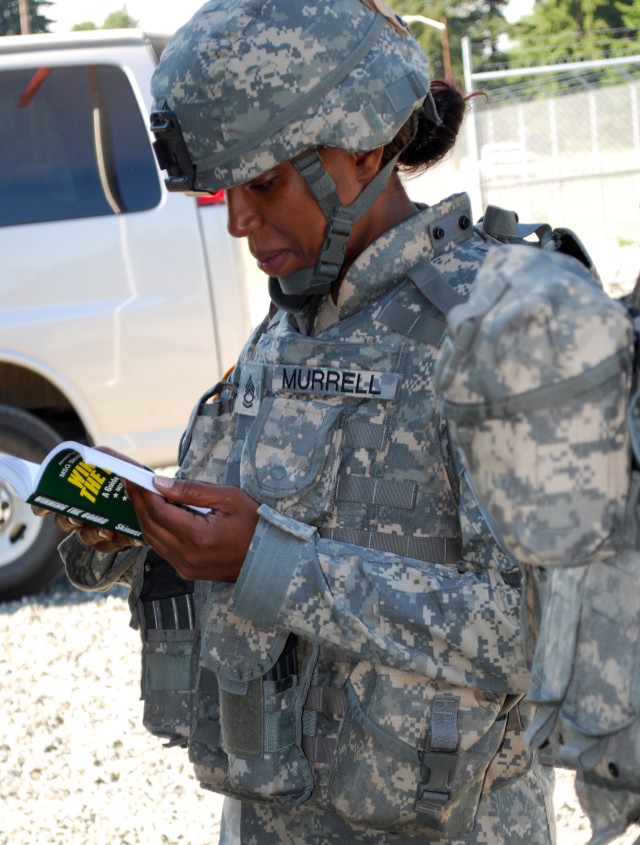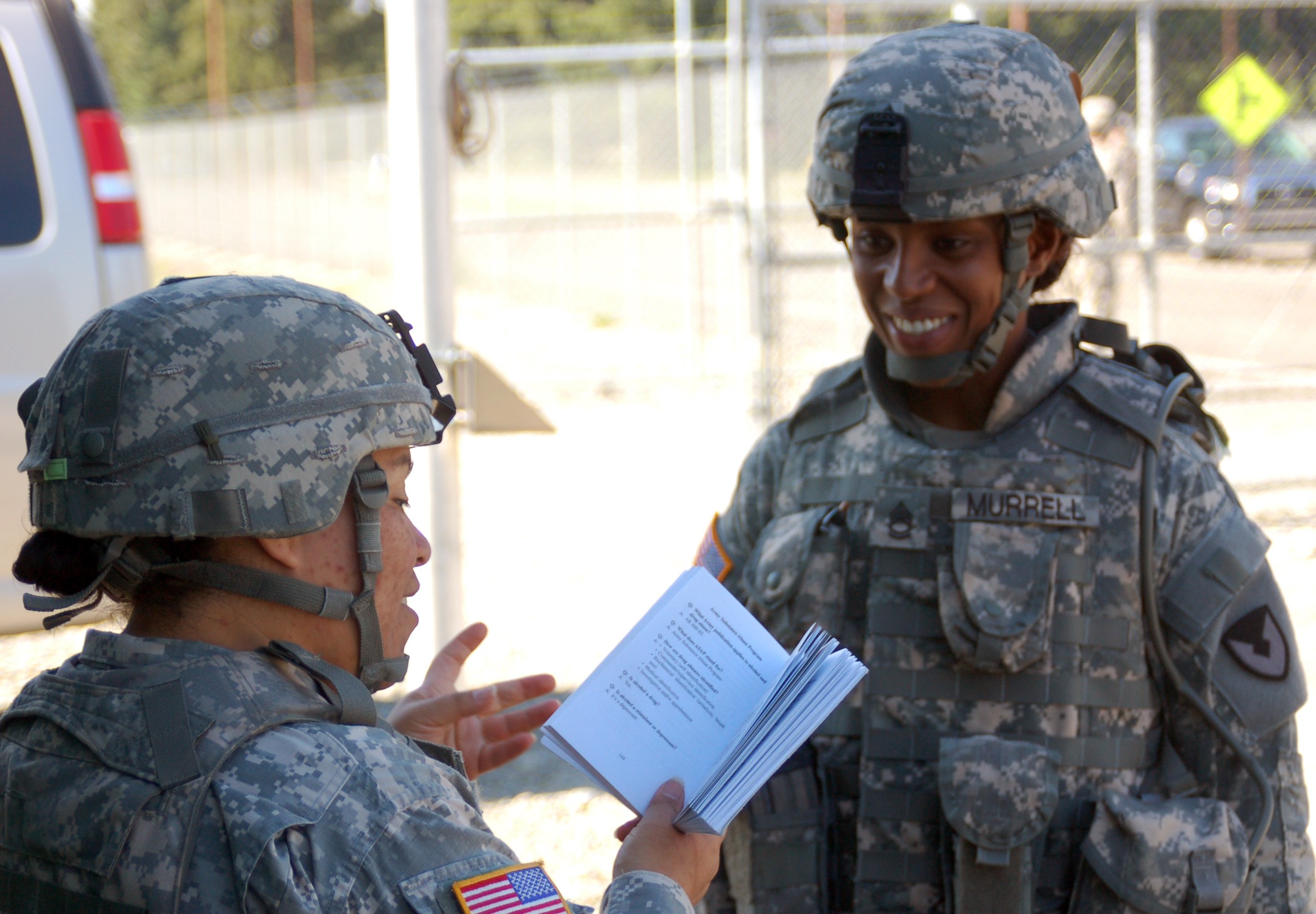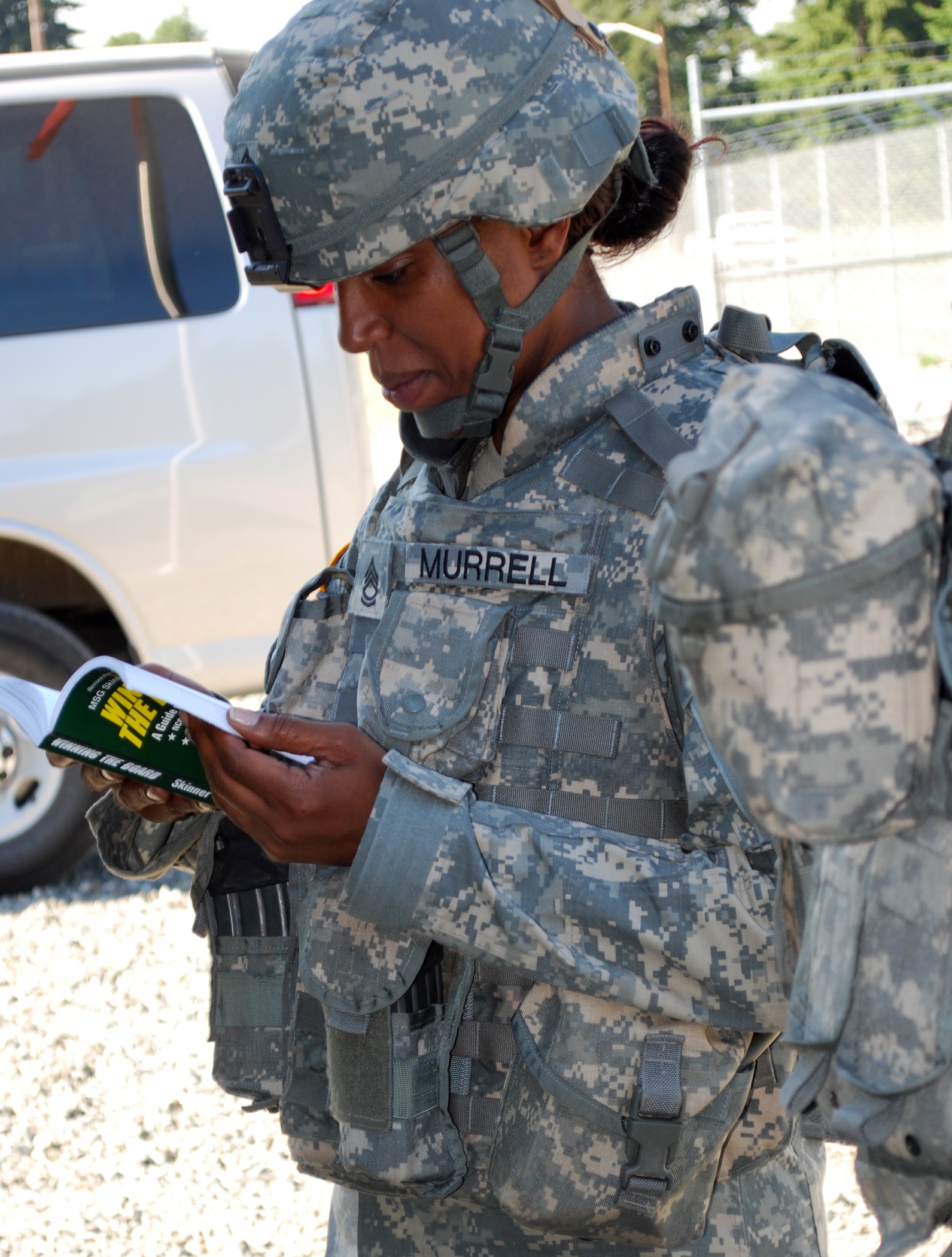FORT LEWIS, Wash. - While some Soldiers were just wrapping up zeroing their weapons on Range 6, others had begun walking toward Range 5 to begin breaking down ammunition for their weapon qualification. Soldiers needled each other about how bad their qualifying scores might turn out to be. Still others told war stories from "back in the day" about their prowess with the M16A2 rifle.
Then, from behind, a pair of noncommissioned officers hustled by raising a small cloud of dust on the gravel road. One was reading questions aloud from a pocket book and the other provided answers as rapidly as they were posed.
"What is Antabuse'" "How do you treat for heat stroke'" "What's the maximum effective range of the M16A2'" "What's the time standard to don your protective mask'"
The pair headed straight for shade be-hind the range shack, where the inquisition continued as the pair removed their personal protective gear for a break from the heat. The forecast called for the first 90-degree day of the year and the shade was disappearing fast. Yes, Fort Lewis, Washington, temperatures can reach into the 90s.
Regardless, the stream of questions continued unabated.
The coach and inquisitor-in-chief was Sgt. Juana Rascon, an acquisition NCO. The respondent was Sgt. 1st Class Tensye Murrell. Both are assigned to Headquarters, 404th Army Field Support Brigade, a U.S. Army Sustainment Command organization garrisoned at Fort Lewis.
In addition to being the unit's automated logistics supply technician, Murrell was the 404th's entry in the ASC NCO of the Year competition held at Rock Island Arsenal, Ill, in June.
Murrell prepared herself for intense questioning from the senior NCOs who sat on her selection board as part of the competition. Apparently, her total immersion system works: she applied the technique to become the honor graduate of her Advanced Noncommissioned Officer Course class at Fort Lee, Va.
"I really don't like to waste available time, especially when I can use it to my advantage. You've got to use it when it's there," she said.
Although Murrell claims to hold no personal philosophy, she is a believer and practitioner of the sentiments expressed in the NCO Creed.
She said her favorite part of the job is the positive feeling she derives from being able to train less-seasoned Soldiers both in military skills and personal development. Murrell sees herself as a "people person" and feels good about being able to provide help and counsel to others ... Soldiers and civilians.
She plans to finish a degree in criminal justice through Troy University's e-ArmyU and work in youth counseling when she retires from the Army.
Her least favorite aspect of military duty is, not surprisingly and unequivocally, the frequency and length of family separations. She is quick to characterize it simply: "It's bad juju," she said.
She served a combat tour as the supply and services NCO for the 317th Maintenance Company, Balad, Iraq.
In the eight years since they met at Fort Campbell, Ky., then married, she and her husband, Sgt. 1st Class Michael Murrell, have had four children.
Joining the 404th this January, Murrell said the other Sgt. 1st Class Murrell, assigned to Headquarters and Headquarters Company, 3rd Stryker Brigade Combat Team, 2nd Infantry Division, has been very supportive of her quest. "He's been coaching and advising me on the different levels of this competition," Murrell said smiling.
When it comes to what little spare time she has, Murrell spends it with her family, church, and the YWCA.
As noted earlier, Murrell espouses no particular personal philosophy. She does, however, point to a verse from Psalm 56 she said is her favorite and provides her a steady azimuth. She quietly recited it: "In God I trust, I will be not afraid. What can man do to me'"
Three goals mark Year of the NCO
This year's competition has an extra boost, taking place during the Army's Year of the NCO. The last Year of the NCO recognized the noncommissioned officer corps in another transitional era in the Army's history. By the time 1989 dawned, then-Army Chief of Staff Gen. Carl E. Vuono, led an Army that had been through 20 years of rebuilding the noncommissioned officer corps after Vietnam, through the fall of the Berlin Wall and the dissolution of the Soviet Union. Today's leadership sees 2009-2010 as the same type of seminal period.
This year's theme is designed to accomplish three goals. The first is to recognize what noncommissioned officers do for the U.S. Army every day, all around the world.
The second is to inform American people of what an under-recognized national asset United States has in its Soldiers. Mostly, it is the quality and dedication of the NCO Corps which is the fabric of that asset.
Finally, the Army will institute a number of programs that will ensure noncommissioned officers will succeed in the 21st century security environment.
In short, the three objectives are to improve recognition, communication and sustainment of the Corps.
The development of a strong NCO Corps helped sustain the Continental Army through severe hardships to final victory. The NCO Corps has been the backbone of the Army for 234 years.
The history of our Army and of the noncommissioned officer began in 1775, with the birth of the Continental Army. The American NCO did not copy the Europeans. He, like the greater American Army, modified what they considered desirable traits, traditions and tactics from the French, British and Prussian armies and melded them into a uniquely American institution.
As years passed, the American political system, disdain for aristocracy, social attitudes and vast westward expansion further distanced the U.S. Army NCO from his European counterparts, creating a truly American noncommissioned officer.
At a time when the force is strained and stretched in foreign theaters, the role of the NCO has never been more important. There are some 250,000 Soldiers deployed to 80 countries with about 547,000 Soldiers serving on active duty.




Social Sharing